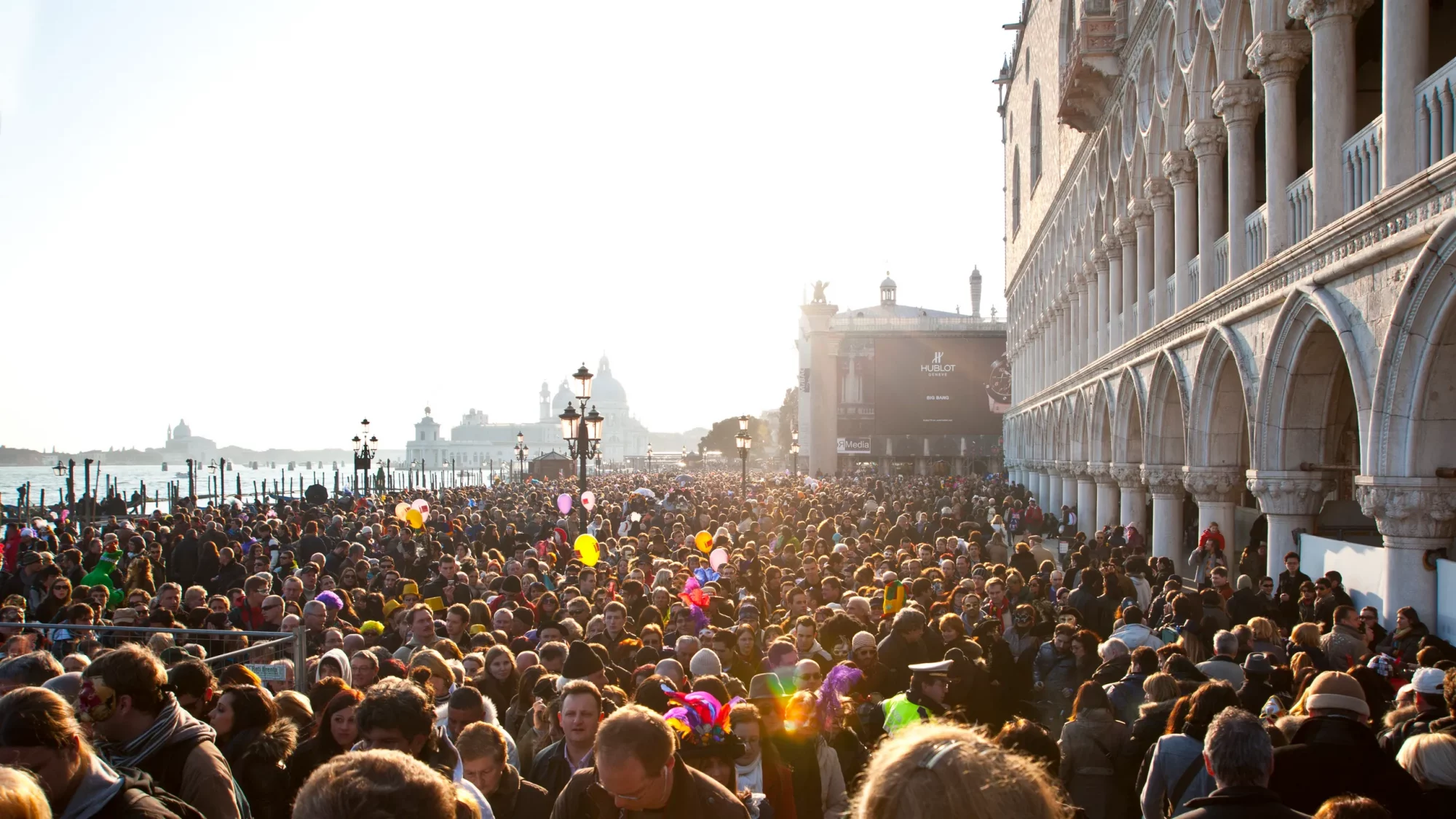
Are you planning a trip to one of the world’s most popular tourist destinations?
Overtourism is becoming an increasingly serious issue in many of these places, as more and more people flock to them each year. Overtourism can lead to overcrowding, environmental damage, and cultural disruption – all of which can have long-term consequences for locals and visitors alike.
You don’t want your vacation to be part of the problem!
That’s why it’s important to understand what overtourism is and how you can travel responsibly. By understanding the impacts that overtourism has on local communities, cultures, and environments, you’ll be able to make informed decisions about where you go and how you get there.
In this article, we will discuss what overtourism is and provide tips on how to avoid contributing to it while still enjoying your travels.


What is Overtourism?
Overtourism is a growing problem in many of the world’s most popular tourist destinations.
Overtourism is the phenomenon of too many tourists visiting a destination at once, resulting in overcrowding, disruption of local communities, and depletion of resources.
This can lead to environmental degradation, cultural disruption, higher prices for locals, and more.
The Causes of Overourism
Overtourism is caused by a combination of factors, including increased access to travel and the rise of digital media. But let’s take a closer look at some of the biggest contributing factors to better understand the issue.
1. Cheaper Travel:
The advancement of technology has made it easier and more affordable for people to travel to distant locations. The biggest factor here is the increasing airfare prices.
This has resulted in an increased number of tourists visiting popular destinations around the world, leading to overcrowding and overtourism.
2. Unsustainable Tourism Practices:
Many of the most popular tourist destinations around the world lack policies or regulations in place to promote sustainable tourism practices. This can lead to environmental damage as well as disruption of ecological balance due to over-development or over-consumption. Furthermore, without regulations in place that support local employment and infrastructure development, tourism can quickly become an economic burden on a destination’s population rather than a boon.


3. Lack of Awareness:
Despite growing awareness around sustainable tourism practices, a lack of knowledge among travelers about how their individual decisions contribute to overtourism remains an issue. Tourists may not be aware that certain activities they engage in while visiting a destination can have serious consequences on its environment and people; for example, taking selfies on fragile coral reefs or buying souvenirs made with endangered animal parts.
4. Poorly Planned Infrastructure:
A lack of proper infrastructure at some destinations has led to overcrowding and congestion issues which result in greater levels of stress for both locals and visitors alike. Inadequate waste management systems contribute significantly to environmental pollution from both human and animal waste products. Poorly designed roads mean additional noise and air pollution from vehicle exhaust as well as increased safety hazards from more vehicles on already congested streets.


How to be a responsible traveler
To ensure responsible travel practices, it is important to wholeheartedly embrace sustainable tourism principles when visiting any destination – whether this includes researching local regulations before you go, supporting local businesses whenever possible, or even just being conscious about your own personal behavior while abroad – to help minimize or even prevent further impacts of overtourism at our favorite places around the world!
Here are a few tips for your next trip:
Respect local customs and cultures when traveling abroad
Respecting local customs and cultures is an important part of traveling abroad. It can also help minimize the impact of overtourism in many ways.
For starters, respecting local customs and cultures encourages travelers to engage with locals, rather than simply consuming attractions like commodities.
When you learn about and observe unique aspects of a culture such as religious holidays, traditional dress codes, dietary restrictions, etc., it enables you to connect more deeply with local people, gain insight into the area’s heritage and history, and be more mindful of how their presence could potentially affect the community.
This type of cultural exchange can also lead to increased economic benefits for locals through responsible tourism initiatives such as homestays or volunteer programs that directly involve local people in tourism activities.
Additionally, respecting local customs and cultures while traveling helps create a better experience for everyone involved by teaching travelers proper behavior when in public spaces – things like refraining from speaking loudly in quiet areas or avoiding taking pictures without permission – making sure that tourists don’t encroach upon other people’s private lives or disturb sensitive ecosystems.
Learning about a culture before going abroad is also useful for helping anticipate certain etiquette practices or potential issues they may encounter while at their destination – all this knowledge can go a long way toward preventing unnecessary conflict while still allowing tourists to immerse themselves fully into an authentic experience.


Consider alternative forms of travel
Slower forms of travel, such as taking the train or boat, can be a great way to mitigate the effects of overtourism. By slowing down our pace and taking in more of the scenery and culture along the way, we can get a deeper understanding of a place and its people.
This form of travel also has other advantages including being more environmentally friendly than air or car travel, and it can even be cheaper in some cases.
Another benefit is the journey itself. When you choose slower forms of transportation, you often come across smaller cities and less popular destinations that might end up being a hidden gem and highlight of your trip. Instead of flocking to one destination hyped up by Instagram, you get to see more of what the world has to offer.


Leave no trace
An essential practice of combating overtourism is picking up any litter you come across while exploring new places. Leave no trace is a principle that guides us to minimize our impact on the environment while traveling.
This means not only carrying out any rubbish you take with you but also being mindful of disposal habits during your travels such as refraining from dumping waste in public areas or waterways and respecting wildlife by avoiding activities like feeding animals, which can disrupt their natural habitats.
It also extends to using biodegradable products when possible and reducing your consumption of single-use items such as plastic bags or bottles. Taking these steps can help reduce the amount of trash that accumulates in areas due to tourism and ultimately slow down the process of overtourism in a given place.


Spread awareness about the importance of responsible travel practices
An easy place to start is by talking about these issues with family, friends, and colleagues.
Discussing the importance of responsible travel practices can help to create a culture of awareness about how to travel ethically and responsibly.
We can also use social media as a platform for amplifying voices from local communities and raising awareness about issues associated with overtourism to generate positive change. Let’s open up the conversation so that we can all learn and play our part in combating the effects of overtourism. Together, we have the power to create a more responsible and sustainable travel culture.
Take part in sustainable tourism initiatives
A few ideas could be volunteering with conservation efforts, participating in eco-tours, staying at eco-lodges, or pivoting to eco-friendly boutique travel providers. Participating in programs like these helps to promote responsible tourism practices, raise awareness about the impact of overtourism on local communities and ecosystems, and provide economic benefits directly to locals.
By supporting sustainable tourism initiatives, travelers can help create positive change while still experiencing all that a destination has to offer.


Wrapping Up
Overtourism is a growing issue, but it’s not an insurmountable one.
By taking the time to research our destination before we go, using alternative forms of travel when possible, leaving no trace behind us, and participating in sustainable tourism initiatives, we can all do our part to help combat overtourism.
So let’s take action today and make sure future travelers get the opportunity to enjoy their destinations as much as we have!

Alisa Goz is a digital nomad, travel blogger, and passionate life-long learner. Join Alisa at AlisaGoz.com for the best tips for stress-free travel. Before starting her blog, Alisa worked as a non-profit fundraiser at top New York cultural institutions. She carries her passion for building community through everything she does.
Like it? Pin it for later on Pinterest!



